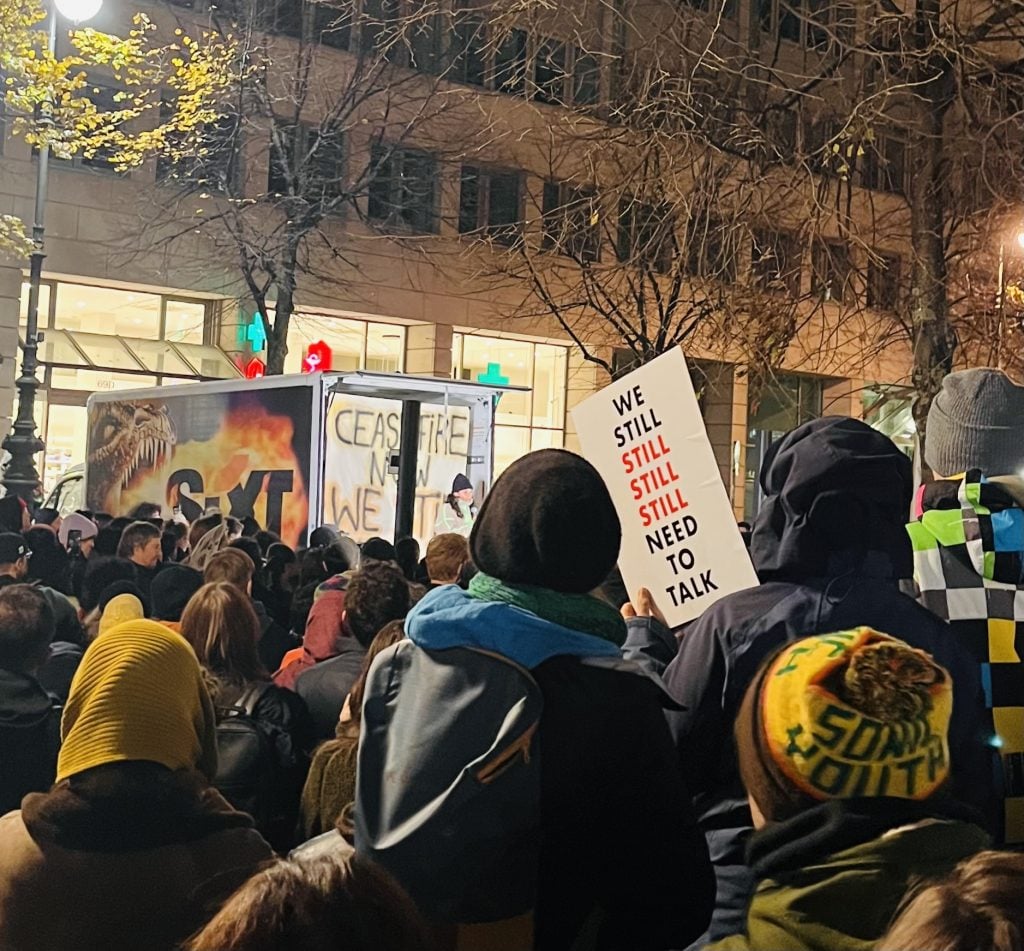Law & Politics
Artists Protest Berlin’s Arts Funding Rule Linked to ‘Controversial’ Antisemitism Clause
More than 4,000 signatories to an open letter say the new measure will hamper freedom of expression.

More than 4,000 signatories to an open letter say the new measure will hamper freedom of expression.

Vivienne Chow

Thousands of mostly Berlin-based artists and cultural workers including the latest Turner Prize-winning Jesse Darling, Germany’s National Gallery Prize-winning Agnieszka Polska, and Candice Breitz have signed a petition protesting the German capital’s decision to make arts funding available only to those who commit to an antisemitism clause, demanding the state withdraw the measure. The authors are concerned the addition of this clause as a prerequisite for funding will silence critics of the state of Israel and undermine freedom of expression.
In an open letter dated January 4 that saw more than 4,000 signatories, artists protested the Berlin Cultural Senate’s decision to include a requirement that cultural producers uphold the clause, which uses the definition from the International Holocaust Remembrance Alliance (IHRA) and the German government’s extension, to be eligible for cultural funding. The letter was addressed to the Cultural Senate’s state minister for culture and social cohesion, Joe Chialo. A protest was also held on Monday, January 8, outside the Berlin State Parliament.
The IHRA definition defines antisemitism as: “a particular perception of Jews, which may be expressed as hatred towards Jews. Anti-Semitism is directed in word or deed against Jewish or non-Jewish individuals and/or their property, as well as against Jewish communal institutions or religious bodies.” The German government has also adopted the following extension: “In addition, the state of Israel, understood in this context as a Jewish collective, can also be the target of such attacks.”
But to artists and cultural workers who signed the petition, Chialo’s policy could endanger the freedom of expression that’s been fundamental for Berlin’s vibrant arts and culture landscape. The letter’s authors argued that IHRA’s definition was “controversial” and contained “ambiguities,” and that by introducing such a measure, it creates an administrative tool to cancel any events or disinvite anyone critical of Israel, including many local and international artists, Palestinian artists, and Jewish cultural workers in Germany who support Palestine. The lack of transparency in the decision-making process went against the principle of democracy, they argued.
The letter was a response to the January 4 announcement on the immediate implementation of the measure by Chialo. The inclusion of such language was intended to strengthen the policies in place to prevent discrimination and antisemitism, according to the announcement. “Art is free! But not randomly. Cultural institutions and funding agencies are responsible for ensuring that public money is not used to promote racist, antisemitic, anti-queer or otherwise discriminatory expressions,” Chialo said in the statement.
The open letter says the Cultural Sentate has overlooked the debate surrounding IHRA’s “ambiguous” definition of antisemitism and an alternative definition from the Jerusalem Declaration on Antisemitism. The latter seeks to clarify the IHRA definition and was drafted to deal with confusion around the IHRA definition. The declaration contains a 15-point guideline; it includes clarifications and examples of what does or does not constitute antisemitism, and states that, for instance, holding Jews collectively responsible for Israel’s conduct is considered antisemitic, while criticizing Zionism and Israel based on evidence are not.
Artists also argue that singling out antisemitism above other forms of discrimination as part of the state’s cultural policy is dangerous and unprecedented, highlighting the lack of similar protections to prevent other forms of discrimination such as Islamophobia and racism. They condemned the measure as repressive against some of their peers, particularly international and Palestinian artists. The signees expressed concern that those who hold critical views of Israeli government policy amid the war in Gaza would face exclusion from the funding, as the new measure has given the administration the power to reject these projects, forcing artists to censor themselves.
“The horrific events of October 7, the war in Gaza and the heated polemical debates that are taking place in Germany on this subject give rise to fears that clauses such as those discussed here will only serve to create an administrative basis for disinviting and canceling events with cultural workers who are critical of Israel,” the letter states.
Controversies surrounding Israel and Palestine have been escalating since the outbreak of the war in Gaza and have become increasingly polarized. The tensions in Germany’s cultural sector have been heightened further after a series of recent cancellations of around 40 projects, most notably the Berlin state’s withdrawal of funding from Oyoun, a cultural center based in the city, after it declined the senate’s request to call off an event staged by Jewish Voice for a Just Peace in the Middle East, an anti-Zionist left-wing group.
The Berlin-based South African artist Breitz, who has had two invitations canceled by state-funded institutions recently, has also asserted that Germany’s public funding system has appeared to “shift to the right” and cultural workers who comply with the state’s policy direction would be given the priority.
More Trending Stories:
Art Dealers Christina and Emmanuel Di Donna on Their Special Holiday Rituals
Stefanie Heinze Paints Richly Ambiguous Worlds. Collectors Are Obsessed
Inspector Schachter Uncovers Allegations Regarding the Latest Art World Scandal—And It’s a Doozy
Archaeologists Call Foul on the Purported Discovery of a 27,000-Year-Old Pyramid
The Sprawling Legal Dispute Between Yves Bouvier and Dmitry Rybolovlev Is Finally Over